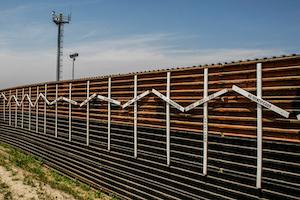First Person
Ask the Expert: Can We Fix Our Immigration Crisis? Professor Ernesto Castañeda Weighs In on Immigration Reform

Ernesto Castañeda is an assistant professor of sociology at American University where he is affiliated with the Metropolitan Policy Center, the Center of Latin American and Latino Studies, and the Center on Health Risk and Society. He is an expert on migration, urban issues, health disparities, vulnerable populations, and social movements.
His most recent book, Building Walls: Excluding Latin People in the United States, will be published this month by Lexington Books. Building Walls puts the recent calls to build a border wall along the US-Mexico border into a larger social and historical context. It describes the building of walls, symbolic and physical, between Americans and Mexicans, as well as the consequences that these walls have in the lives of immigrants and Latin communities in the United States.
Here, Castañeda shares his expertise on our current immigration crisis and the need for immigration reform.
Thousands of children have been separated from their parents at the US-Mexico border. What are some of the long-term effects on their well-being?
These separations are traumatic and have life-long consequences which can include a chronic sense of insecurity and uncertainty, feelings of abandonment, reduced trust in others including their parents, difficulty forming intimate relationships, reduced self-esteem, and fear of authorities.
What would happen if the US-Mexico border WAS closed?
Millions of people, vehicles, and goods cross the border every day for legitimate purposes. Closing the border, whether tomorrow or in a year, would have an immediate impact on the families and businesses that depend on frequent border crossings, including small business manufacturing, retail, the car industry, and the supply of medical equipment. Closing the border is untenable beyond a few days, and it would be another example of a policy inflicting self-harm. Cities and communities on the US-side of the border would be immediately impacted with citizens who live in the Mexican-side not being able to make it to school and work. Malls and retail on the US-side, which largely depend on Mexican customers, would also suffer substantial financial loses. Closing the border would affect the delicate harmony between the many twin border cities which are already impacted by long wait times to cross.
What is the most viable answer to fixing the immigration system? Is it general amnesty?
Yes, an amnesty would go a long way to regularize people who are American all but on paper. An immigration reform that is comprehensive and inclusive would permit people who have Temporary Protected Status (TPS) to become legal permanent residents, allow the DREAMers and their family members to become citizens, and strengthen labor protections and living wages for all by bringing workers out of the informal economy.
This “so-called” immigration problem is fixable with time and the appropriate federal laws. This would allow people who are escaping violence in their home countries to be able to stay in the US to keep contributing to our economy and society. The overwhelming majority of immigrant and asylum seekers do not depend on welfare or charity to live in the US in the long run, because they work to support themselves. The US has such a large economy and geography that another amnesty would not negatively impact current citizens. On the contrary, it would guarantee that our constitutional principles, respect for individual rights, and democratic values are enjoyed and cherished by everybody living within the US territory. A comprehensive amnesty would strengthen America’s democracy, economy, and culture.
Do you believe there is hope for a bipartisan bill that will achieve these goals?
If our representatives want to provide a pragmatic solution to the uncertainty produced among immigrant and natives by anti-immigrant headlines, they should work on a comprehensive immigration reform; one with paths to citizenship for those already here and provide a legal framework for people to come in the future if they face persecution in their countries or if they satisfy labor shortages at the lower and higher levels of the labor market. The United States has a long history of being able to incorporate immigrants successfully. As I discuss in my new book Building Walls: Excluding Latin People in the United States, xenophobic, racist, restrictionist, and exclusionary laws now and in the past have unduly complicated things for immigrants and for us without achieving their intended goals. According to multiple surveys, most Americans support a comprehensive immigration reform with a path to citizenship, and it is time for representatives to follow the will of the people.
